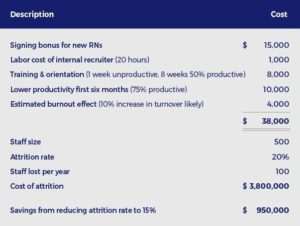 Nurse mental health has long been a topic of discussion among health leaders, but amid Covid-19, the conversation has come to the forefront. Poor nurse mental health leads to burnout and high turnover rates. Cash-strapped hospitals — especially those in rural communities — have a difficult time keeping their doors open. In fact, according to a report in Health Leaders Media, approximately 350 hospitals were at risk to close.
Nurse mental health has long been a topic of discussion among health leaders, but amid Covid-19, the conversation has come to the forefront. Poor nurse mental health leads to burnout and high turnover rates. Cash-strapped hospitals — especially those in rural communities — have a difficult time keeping their doors open. In fact, according to a report in Health Leaders Media, approximately 350 hospitals were at risk to close.
High nurse burnout, among other factors, is contributing to the nurse shortage in the US. With the Covid-19 pandemic, healthcare facilities are struggling to keep costs down. Labor costs have increased as a result of the virus, with HIT Consultant reporting traveler costs have about doubled nationwide. If chief nursing officers can lower burnout and turnover rates, they can decrease contingency spend.
The Cost of Attrition
The cost of hiring a new nurse includes any recruitment fees, onboarding, training and orienting, and coping with decreased productivity in the first few months. To best understand how much you are spending on hiring a new nurse, it might be a good idea to build a table to calculate your fees.

Example cost-per attrition table
According to a study by NSI Nursing Solutions, the average cost for turnover is $44,400. You may be spending more than you realize when it comes to processing new hires, which is why lowering burnout and turnover is essential to your bottom line.
Strategies to Promote Retention
To best prevent burnout, it’s an excellent important to understand the symptoms of burnout. Common symptoms include cynicism in the workplace, unacceptable bedside manner, disengagement, or depersonalization.
Here are tactics to implement if your nurses begin to show the signs of burnout.
Self-care & resilience training. If nurses are taking care of themselves, they will best be able to tend to patients at the bedside. Nurse leaders may want to consider offering wellness or stress-reduction workshops. Studies show that self-care and breathing techniques can incorporate elements of mindfulness into their life.
Resilience training is also an excellent tool for promoting mental health, especially to nurses working in critical care units. For nurses that face high rates of mortality or morbidity, they may require coping mechanisms when dealing with these stressors. Psychological resilience is linked to lower burnout rates in nurses.
Mentor and buddy program. It’s common for new nurses to feel overwhelmed in their roles, especially if they recently graduated. A buddy program is a great way to integrate new nurses into a facility. By partnering with an experienced nurse with a new nurse, it can help new staff members feel a part of the team. It will encourage positive feedback while fostering a sense of companionship.
Nurse recognition programs. Nurse recognition can keep nurses engaged and lead to an increase in patient satisfaction. Consider implementing recognition programs, including awards in service (years of loyalty to the organization), nurses going above and beyond, and exceptional patient care. Some organizations partner with the DAISY Foundation or develop homegrown programs to honor outstanding nurses.
Expressing an appreciation for RNs striving to make a difference has a substantial impact on the overall morale of the staff.
Long-term solution: International nurse staffing. International nurses working on long-term contracts are a solution that allows for staff continuity and stability. International nurses are recruited through agencies like Avant Healthcare Professionals to work in healthcare organizations in the U.S. They work on a contract (for the agency) at the client’s facility until they convert to the facility’s full-time staff. The advantages of international nurse staffing include; rates that are significantly less than travel, improved stability to high turnover units, and an overall reduction in nurse burnout.
The Bottom Line
Nurse turnover and burnout have long since been a top concern for CNOs, since hiring new nurses can be costly. As a result of the pandemic, turnover and burnout have been exacerbated, bringing conversations like nurse mental health to the forefront. Luckily, there are strategies to help increase nurse retention to ensure patient safety and decrease contingency spend.








